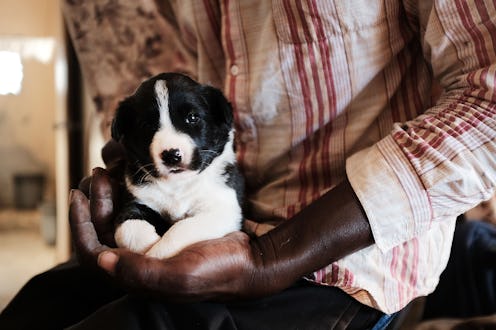Life
8 Things You Should NEVER Say To Someone Who Just Lost A Pet

Domesticated animals are not — simply — "just" pets. They're family members. Our best friends. The loss of a dog, cat, bird or other beloved creature can be devastating. There's a grieving period and the support of human friends can be critical during it. With that in mind, there are what not to tell someone who has lost a pet. Because if you're friend is in fragile condition over the recent loss of a pet, you'll want to demonstrate empathy.
According to a study reported by AOL, "71 percent of females reporting bereavement of a family animal is just as devastating as a relative." Supporting someone through a mourning process can be tricky landscape to navigate. It's sensitive and you don't want to say the wrong thing that sends them down a spiral of sadness. There are plenty of good things to say. Memories to honor. And then there are the major, bold off-limits phrases. Because they will help nobody.
Surprisingly, some of the things you shouldn't say seem positive. But in a tragic situation, sometimes it's OK to recognize that things ... suck. And that the ordeal is hard. And that what's happening isn't fair. Trying to find the good in a loss doesn't help the situation. It's sensitive terrain, but you can totally navigate it and show sympathy to a friend — just watch where you step!
"They're in a better place."
While this phrase seems like it rolls off the tongue as a genuine sentiment of sympathy, it's notoriously not the right thing to say. It seems to shrug off the significance of their existence with their pet-parent.
"There's an adoption event next week."
The best way to nurse a friend through the loss of a pet is not by reminding them there are more potential pets out there. The last thing they probably need is to be whisked off to an adoption event to find their new best friend. Because pets are viewed by many pet parents as family members, they can't be replaced. Suggesting a friend find a new pet to fill a void is disrespectful.
"At least you have other pets."
If your friend has more than one pet, they know. But that doesn't make the loss of one any easier. And just because they're grieving doesn't mean they love their other dogs or cats or birds any less.
"It was just a dog."
Excuse me, it was not just a dog. It's never ~just~ a dog. As mentioned multiple times above, pets are regarded as and loved like family. Avoid reducing the relationship of a pet and pet-parent to something insignificant. Instead, bring up memories of how funny that dog was. Honor their personality instead of trying to help by making their existence forgettable.
"Think about how much money you'll save."
Yes, once you parent a pet, your wallet will open a lot more often. Attempting to lighten up the mood by spotlighting the "bright side" of things — such as a fuller wallet — won't inspire your friend to quit their crying. Your friend would probably 10/10 drain their life savings to keep their pet healthy and happy without blinking — again and again.
"You'll get over it."
If your friend is grieving, shrugging it off by telling them they'll get over the loss is a punch in the gut. Don't say this.
"I mean, it was always such a problem animal for you anyways."
Yes, pets gnaw through expensive furniture. They pee on rugs. They find the custom made linen apron you're emotionally attached to and shred it. But pets show remorse, also known as puppy dog eyes. While pets can be a heavy responsibility, the loss of one isn't a weight lifted. Don't harp on all the issues the pet gave the pet-parent.
"They were really old, so ..."
We're all familiar with the circle of life. We know how it works. But that knowledge doesn't make the end of a pet's life any easier — even if the life was long and full. Try not to reason with your friend, especially during their grieving process. Instead, let them know they did such a great job keeping their pet healthy and happy for so long.